At Hari Shree, we are committed to a balanced development of the whole person. Holistic education is educating the whole person beyond just academics. We aim to help children develop physically, emotionally, intellectually, cognitively and spiritually using a comprehensive learning approach. The curriculum is supported by robust co-curricular and extra-curricular programmes, Culture based value education and leadership opportunities.
We provide a safe and supportive environment where students are guided to reflect on themselves and the impact of their actions on the local and global environment and lead children to take ownership for their learning.
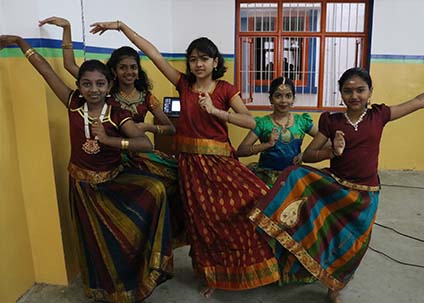
The visual and performing arts programs provide an opportunity to students to explore their creativity in an individualistic and unique way. The programme has a multi-genre, multi-modal and multi-disciplinary approach to it.
At the pre-primary and primary levels, all children learn music, dance, art and theatre. At the middle school and high school levels, visual/performing arts are offered as part of the Creative Expressions (CE) program. Students can choose from among a variety of choices offered. We partner with experts in the respective fields to provide a rich learning experience to children.

Art and crafts encourage children’s self-expression and creativity. Age-appropriate kinaesthetic activities are incorporated into the curriculum.
At the primary and middle school levels, integrating art with other subjects facilitates in- depth understanding of concepts learnt. Children express their understanding of culture and festivals through appropriate art and craft activities.
At the secondary and senior secondary level, the art curriculum provides a wide knowledge of different artists, art forms, media and techniques.

Education through music is a great way to learn. We partner with experts in the field to provide our students with a rich learning experience.
At the Primary level, the musical experience includes approaching other subject disciplines with the creativity of music. There is a focus on specialising in STEM through art integration.
At the middle school and high school levels, students can choose between Western and Indian Classical music. They get an opportunity to learn and showcase various styles and genres.

Learning Dance helps children focus, have patience and a clear presence of mind, improve creativity and instills a sense of self-discipline. At the Primary, introducing children to diversity of dance styles through different classical and regional songs facilitates understanding of varied culture and traditions of our country.
At the middle school and high school levels, students get an opportunity to learn various styles and genres under the two main categories of Western & Classical Dance. They are introduced to diverse dance forms each with its own distinct cultural and aesthetic appeal.
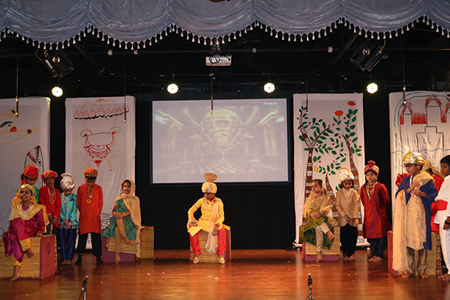
Theatre aids in enabling students to develop their sensitivity, understand group relationships and dynamics, nurture good enunciation and diction. Theatre classes are designed to offer students the space for equality, equity, empowerment and freedom.
At the Primary, the theatre curriculum focuses on enhancing the intuitive, instinctive, impulsive and imaginative skills of the students. It is designed to empower imagination and articulation so that students are more knowledgeable and expressive about themselves and their surroundings.
At the middle and high school levels, the activities pan across the three main divisions of theatre – acting, designing and direction to help them understand heightened reality, acquire narrative skills and delve deeper into texts and contexts.

Sports is an important component of the Hari Shree curriculum from pre-primary to high school years, as it promotes an overall development, fitness and agility.
A systematically planned indoor and outdoor playground in the pre-primary campus ensures mastery of perceptual and motor skills needed for reading, writing and math. Sports activities at this level are designed to enhance socio-emotional skills, self discipline and as team building activities that promote working together.
During primary years, sports promote social skills and collaborative work. It improves relationships with peers, helps them to follow simple rules, adhere to boundaries and be introduced to the concept of working in a team.
Middle and high school sports focus on developing accountability, responsibility, resilience, sportsmanship and team spirit. In addition, sports produce endorphins which reduce stress and induce calmness in students.
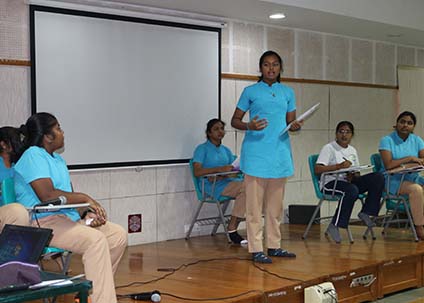
Hari Shree works on personality development through proper stimulation, direction and guidance. “The Leader In Me” program is conducted towards this goal. The program is built on the foundations laid by “The Seven Habits of Highly Effective People” by Dr Stephen R Covey, an American educator and doctor. Implemented from grades 2 to 8, the program is designed to help discover the potential within every child, and equip them with essential leadership skills to be life-ready.
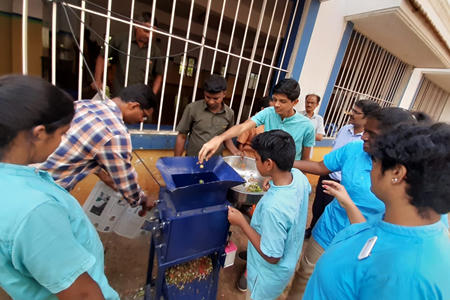
Our Global Citizenship program encourages children to understand global issues, appreciate the importance of using the earth’s resources mindfully and work towards a sustainable future. Students observe and research the impact of global issues on the local environment and understand the varied impact on their communities. They use critical thinking to implement solutions in their communities, collaborate with one another, and share their learnings; enabling them to be responsible, global citizens.
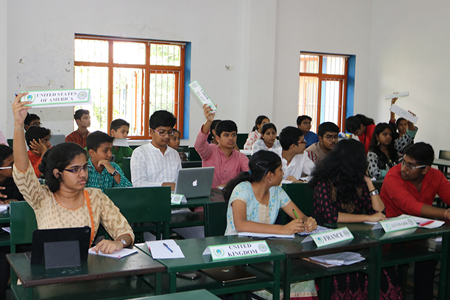
Debating is a skill that makes children enquire and explore, be aware, critically analyse issues, listen to and understand perspectives, analyse critically, express their stance clearly and confidently,reflect and be empathetic human beings. Children are trained in debating both by teachers and by resource persons. Children participate in inter-school debates as teams and also in debates and declamation events conducted by the Council every year. Children have been consistent in emerging as winners and best speakers at the regional and national levels.
The school hosts an annual inter-school Model United Nations conference. The event provides a platform for students to enhance specific skills like research, policy analysis, active listening, negotiating, conflict resolution, arriving at a consensus, note taking, technical skills, writing skills and event management skills. The training to participate in Model United Nations provides a foundation for students to grow and evolve gradually into confident delegates who can participate in MUN conferences across the world.
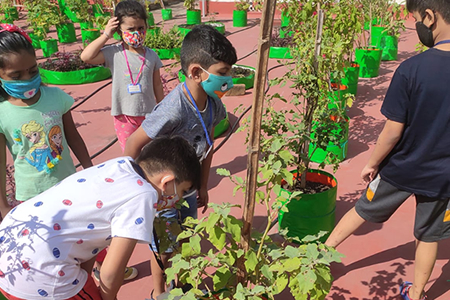
Our vision includes educating our children to become responsible citizens who contribute to nature, mindful of sustainable development. This is strengthened by our unique measures towards nature education. The terrace garden and green courtyards in the campus provide students the opportunity to grow, care for and nurture plants, improving their relationship with nature. They also understand the true meaning of ‘coexistence in nature’ as they observe the interdependence of plants and insects as they grow together.
Growing plants in the garden and nurturing them allows children to understand how food grows, to establish a healthy relationship with food and to respect food. They observe the plants from germination to the stages of growth, flowering and yielding fruit to finally, when they go back to the soil nourishing it, thereby contributing to the life cycle of a new plant. In the process, children learn to pause, be patient and understand it takes time to achieve the desired results. The larger understanding of our food being our responsibility seeps into the children over time, helping them take the thought back to the larger community. Children progress from a consuming mindset to one that nurtures, nourishes, cares for and contributes to the environment.
Working with soil, sowing seeds gives a sensory experience and helps children in their developmental years. It provides them with sensorial experiences involving senses like the visual, the auditory, the tactile and the stereo-gnostic.
This experience with nature can motivate students to grow their own gardens, anything from a windowsill box, to a few containers in a balcony, to a full garden in an unused courtyard space or terrace.
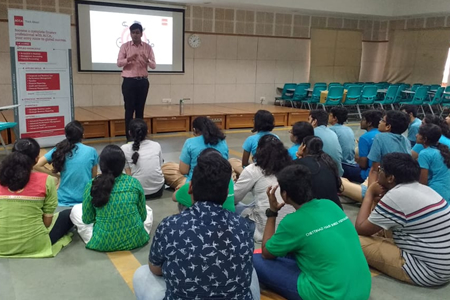
The Skill Development Cell and the Career Guidance Cell work with resource persons and bring in experts to interact with students and guide them. At the middle and high school levels, career guidance is provided to empower students to choose their subjects and to guide them in applying for the right courses for higher education. A network of alumni and parents share their experience in their fields of expertise, through interactions and lectures.
Additional academic counselling and career guidance is provided for students of the secondary and senior secondary, in partnership with external organizations. This career guidance program offers online career assessment and mapping platform, online career guidance webinars, automated career planning tool and tracker, and curated career information and database.
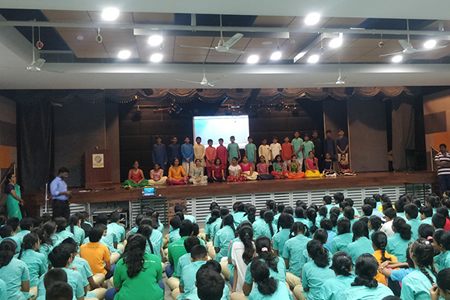
Assemblies are an integral part of the morning schedule. They provide opportunities for students to come together and interact with larger groups, present their views, address common issues, showcase their skills, and celebrate special days and festivals.

After school activities are non-scholastic in nature and focus on the interests of students by providing an engaging space for them to enhance their creative and sporting skills, beyond the regular school day. Students are encouraged to engage in activities that they have not been exposed to before.

The well-being of a child stems from the feeling of safety and security and extends far beyond just the physical. The mental and emotional wellness of the students is an important part of our routine.
All images and text @ Copyright Chettinad Hari Shree Vidyalayam. All Rights Reserved.